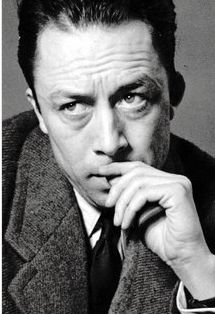L'Exil et le Royaume
Book Details
| Title: | L'Exil et le Royaume | ||||||||||
| Author: |
| ||||||||||
| Published: | 1957 | ||||||||||
| Publisher: | Gallimard | ||||||||||
| Language: | French | ||||||||||
| Tags: | non-fiction, philosophy | ||||||||||
| Description: | Exile and the Kingdom is a collection of six short stories by French-Algerian writer Albert Camus. The underlying theme of these stories is human loneliness and feeling foreign and isolated in one's own society. Camus writes about outsiders living in Algeria who straddle the divide between the Muslim world and France. The six works collected in this volume are: —"The Adulterous Woman" ("La Femme adultère") —"The Renegade or a Confused Spirit" ("Le Renégat ou un esprit confus") —"The Silent Men" ("Les Muets") —"The Guest" ("L'Hôte") —"Jonas or the Artist at Work" ("Jonas ou l’artiste au travail") —"The Growing Stone" ("La Pierre qui pousse") [Suggest a different description.] |
||||||||||
| Downloads: | 668 | ||||||||||
| Pages: | 111  |
Author Bio for Camus, Albert

Albert Camus (7 November, 1913—4 January 1960) was a French-Algerian author, journalist, and playwright best known for his absurdist works The Stranger (1942) and The Plague (1947). He won the Nobel Prize for Literature in 1957 at the age of 43, the second youngest recipient in history.
Born in Mondavi, French Algeria, Camus did well in school and was admitted to the University of Algiers where he studied philosophy and played goalie for the soccer team. He quit the team following a bout of tuberculosis in 1930, thereafter focusing on academic study. By 1936, he had obtained undergraduate and graduate degrees in philosophy. He became political during his student years, joining first the Communist Party and then the Algerian People's Party. As a champion of individual rights, he opposed French colonization and argued for the empowerment of Algerians in politics and labor. Camus would later be associated with the French anarchist movement. He was one of the few Allied journalists to condemn the American use of the atomic bomb in Hiroshima. He was also an outspoken critic of communist theory, eventually leading to a rift with Sartre whom he had met during the war when he joined the French Resistance movement.
The dominant philosophical contribution of Camus's work is absurdism. While he is often associated with existentialism, he rejected the label, expressing surprise that he would be viewed as a philosophical ally of Sartre. Elements of absurdism and existentialism are present in Camus's most celebrated writing. The Myth of Sisyphus (1942) elucidates his theory of the absurd most directly. The protagonists of The Stranger (1942) and The Plague (1947) must also confront the absurdity of social and cultural orthodoxies, with dire results. In Caligula, a play, a Roman Emperor pursues an absurd logic.
As an Algerian, Camus brought a fresh, outsider perspective to French literature of the period—related to but distinct from the metropolitan literature of Paris. In addition to novels, he wrote and adapted plays, and was active in the theater during the 1940s and '50s. His later literary works include The Fall (1956) and Exile and the Kingdom (1957).
He died in Burgundy, France in a car crash with his publisher on January 4, 1960.—Excerpts from biography.com
Available Formats
No book directory. Upload has not been completed.This book is in the public domain in Canada, and is made available to you DRM-free. You may do whatever you like with this book, but mostly we hope you will read it.
Here at FadedPage and our companion site Distributed Proofreaders Canada, we pride ourselves on producing the best ebooks you can find. Please tell us about any errors you have found in this book, or in the information on this page about this book.